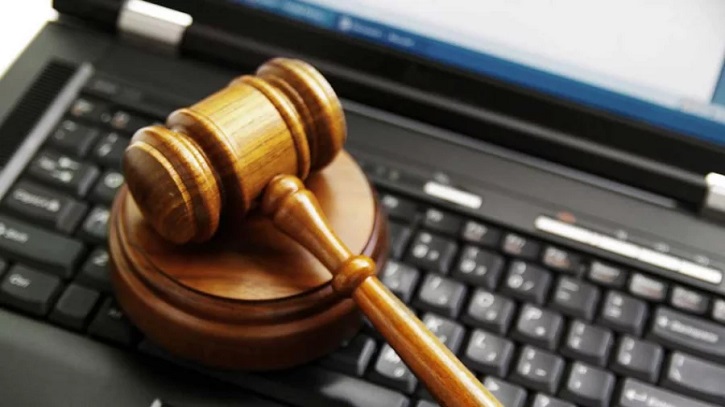Is the newly proposed Cyber Security Bill just old wine in a new bottle?
The recent cabinet decision to replace the much-talked-about Digital Security Act-2018 (DSA) with a new law, Cyber Security Bill-2023, has created an uproar among the rights defenders, lawyers, journalists, NGOs, and the civil society members.
According to them, the new law is going to be another version of the existing draconian law, which monstrously empowered the police and other law enforcement agencies to curb freedom of speech, freedom of the press, and muzzle dissent voices — the DSA.
This is indeed true, to a large extent, that the Cyber Security Bill-2023, most likely to be passed in the September session of the Awami League-led parliament, is identical: Almost all of the sections of DSA have been kept intact, except section 29, which was largely abused against the opposition, dissent voices, and journalists.
Section 29 of the DSA contains the provision of jail term for three years for defamation. The proposed Cyber Security Bill-2023 has dropped the jail term from section 29 — a move that people have praised.
Reading the draft of the new proposed law, it seems that the basic difference between the DSA and Cyber Security Bill-2023 is the extent of jail term: The DSA has longer jail terms while the Cyber Security Bill-2023 proposes lower jail terms.
For instance, section 21 of the DSA stipulates anyone launching or aiding to launch any propaganda or campaign in any digital platform about Bangladesh’s war of independence, the spirit of the war of independence, Father of the Nation Sheikh Mujibur Rahman, national anthem, or national flag will face maximum prison sentence of 10 years or a financial punishment of Tk 10 million or both. Repeat of such offenses will enhance the punishment to life sentence or a fine of Tk 30 million or both.
In section 21 of the Cyber Security Bill-2023, the punishment for the aforesaid “offenses” is seven years’ imprisonment or a fine of Tk 10 million or both.
The purpose of this article is not to dissect the DSA or the Cyber Security Bill-2023, rather point out a common action of the two major political parties in Bangladesh since 2006 — the Awami League and the Bangladesh Nationalist Party (BNP).
The two parties have confrontational political relations, but they have been on the same page when it comes to suppressing dissent, curtailing freedom of expression, and the freedom of the press through enacting digital laws.
Since 2006, ahead of every general election, the ruling parties have either enacted a new digital security law or amended the previous such law. The digital space, in particular social media platform Facebook, has started to play a big role in shaping the public opinion in Bangladesh as the number of Facebook users has seen an exponential growth.
The then ruling BNP, which came to power in October 2001 and quit power in late October 2006, ahead of the ninth general election, scheduled to take place in January 2007, enacted the first ever digital law in Bangladesh — the Information and Communication Technology (ICT) Act 2006.
The law became a tool for the governments that followed the BNP administration: The military-led caretaker governments and the Awami League that came to power in late December 2008 general elections. Before the general elections under a non-partisan caretaker government, the victorious Awami League promised scrapping the ICT Act-2006 and other bad laws infringing people’s constitutional rights.
But the ruling Awami League did not rescind the ICT Act-2006. Contrary to its promise, they, ahead of the next general elections in January 2014, in October 2013, amended the ICT Act-2006, and extended the punishment from 10 years to 14 years in four sections of the law. One of the amended sections was controversial section 57. The amendments also set four online offenses that would be non-bailable.
The widely abused section 57 was rightfully dreaded by rights activists, freedom advocates, journalists, and common people. At least 700 cases were filed under section 57, which was non-bailable.
The section 57 stipulated that, intentionally posting false, provocative, indecent or sensitive information on websites or any electronic platforms that is defamatory, and can disrupt the country’s law and order situation, or hurt religious sentiments, is a punishable offense.
Amid much controversy and protests at home and abroad, the Awami League government, ahead of the December 2018 general elections, in August 2018 enacted a new law, the Digital Security Act-2018, and repealed section 57 and four other sections of the ICT Act-2006.
The Awami League retained power by winning the 2018 general elections, also known as 11th parliamentary polls. Here started the misuse and abuse of the Digital Security Act: At least 7,000 cases were filed between late 2018 and January 2023.
The rights defenders, including the editors, took to the streets demanding the cancellation of some of the widely abused sections of the DSA. Even the UN agencies urged the government to put an end to the DSA.
The domestic and international pressure to cancel or at least reform the DSA-2018 forces the government, ahead of the December 2023 general elections, to announce that they would replace the DSA with a new digital law, the Cyber Security Bill-2023.
The newly proposed law would not allay the fear of rights activists and journalists, however.
One rights activist, Nur Khan, told me:
“The new Cyber Security Bill-2023 is old wine in a new bottle. This law will continue to be abused up to the next general election in 2028.
“Before every general election, there will be a new digital law to victimize the people who speak out.”
Kamran Reza Chowdhury is a journalist.
Source: Dhaka Tribune.

